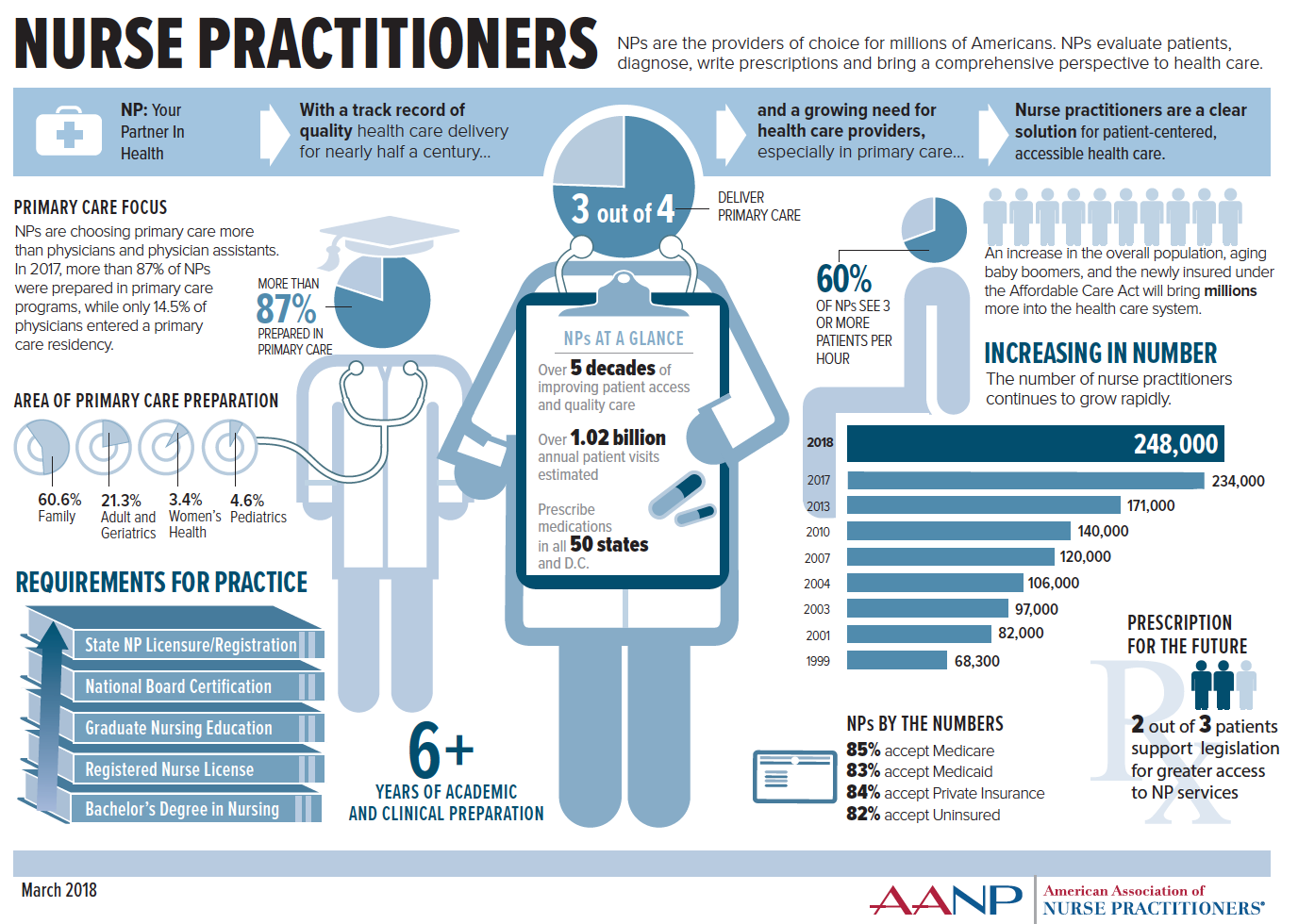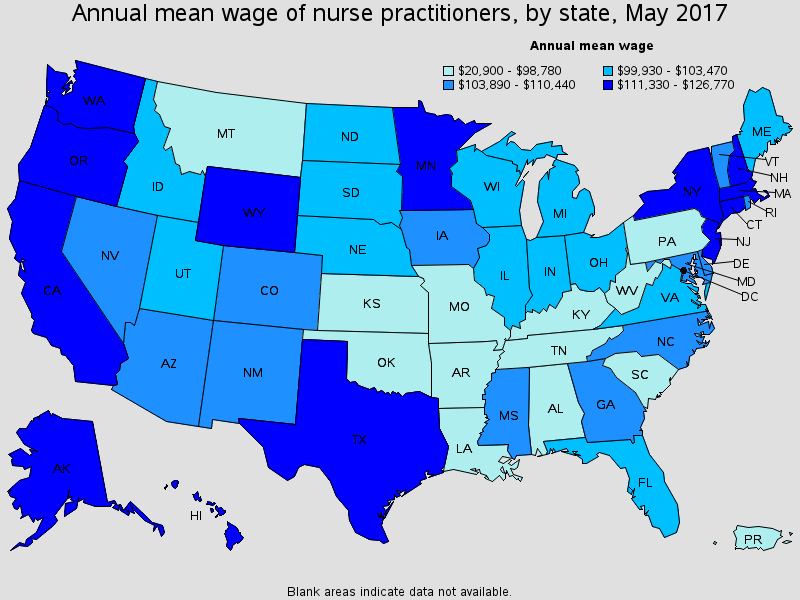
Family Nurse Practitioner Guide
One of the qualities that make for great Registered Nurses is a passion for treating patients. Obviously, everyone in healthcare treats patients in some way or another, but the defining trait of an RN is direct care – hands-on, close-quarters, emotional and medical support. At the same time, the day to day grind of being a staff nurse can become stifling – even a little boring. For nurses who love working directly with patients, but also crave more responsibility, authority, and salary, becoming a Nurse Practitioner is often the route to go. And for nurses who like the feeling of working with diverse patients – people of all ages and types – a Family Nurse Practitioner may be the ideal career. So what is an FNP, and why should you want to become one?
Nurse Practitioners

What is an FNP, and What Do They Do?
A Family Nurse Practitioner is a specialized Nurse Practitioner role that is also often (and a little more poetically) called “Lifespan Nursing.” According to the American Association of Nurse Practitioners (AANP), Family Nurse Practitioners make up the largest subgroup of Nurse Practitioners. An FNP is an advanced practice RN specializing in family care; unlike other specialized NPs, who may focus specifically on gerontology nursing, pediatric nursing, or some other niche, a Family Nurse Practitioner job description is very much like that of a family doctor. Family Nurse Practitioners treat patients across all ages – hence the “lifespan” name. From birth to old age, FNPs see patients across the lifespan, focusing on the health of the entire family unit.
The FNP Role Is Broad
One of the special benefits of being a Family Nurse Practitioner is that you are able to work with patients of all ages. FNPs, because they often see multiple members of the same family over a long period of time, may be especially interested in the ways family health impacts the whole family. In the broader role of a Family Nurse Practitioner job description, FNPs may treat very mild or common ailments, like flu and injuries, or serious issues like chronic, debilitating diseases, especially as they affect health in older age. If they are seeing many members of the same family, FNPs can develop the kind of relationship that family doctors develop, and will be more able to recognize recurrent, genetically linked, or environmental illnesses. With that close, generation-spanning relationship, FNPS may be able to better treat sickness from one family member to the next.
FNP Compared to a Doctor
So compared to a medical doctor or a conventional registered nurse, what is an FNP allowed to do? The Family Nurse Practitioner job description takes a little from column A, and a little from column B. Family Nurse Practitioners are advanced-care nurses, so like nurses, they will spend more time in direct patient care than the average medical doctor. In most of the the US, nurse practitioners must work under the supervision of a doctor, but in nearly half of all states, nurse practitioners have complete practice authority – they do not need any physician to oversee them. That means that they are not only seeing patients directly, but are often entirely in charge of their care, from diagnosis to treatment to follow-ups and assessments.
Unlike nurses, however, FNPs are allowed to write prescriptions and develop treatment plans for patients (either with the approval of the supervising MD, or on their own authority). That, of course, is a very serious responsibility, and Family Nurse Practitioner certification depends on FNPs having the education and experience necessary to take on that responsibility. On the other hand, many FNPs would argue that this dual role is actually one of the benefits of being a Family Nurse Practitioner; because of the direct contact with patients, being an FNP can be much more rewarding, on a personal and emotional level, than being a doctor.
How Do I Become an FNP?
To become a Family Nurse Practitioner, you’ll need to start out as an RN. But, if you’re considering becoming an FNP, there’s a good chance you’ve already done that (if not, take a look at “How Do I Become an RN?”) If you’re already an RN, there are a couple of routes you could take to get to your Family Nurse Practitioner certification. The first route is getting your Bachelor of Science in Nursing degree through an online RN to BSN program, but that will only actually get you halfway there.
An FNP program is a subspeciality of an MSN degree, so a BSN won’t get you to the Family Nurse Practitioner certification. If you know that an FNP is your career goal, it’s better to get a jump on the situation with an RN to FNP program. A specialized RN to FNP program is a bit of a misnomer – you’re actually earning a Master of Science in Nursing, which is the prerequisite for getting a Family Nurse Practitioner certification (you can also get the FNP certification with a Doctor of Nursing Practice, if you want to go that far). Keep in mind that the MSN program has to be accredited by the CCNE or the ACEN to count toward FNP certification; otherwise, you’re wasting your time.
Nurse Practitioner Certification Exam
So once you have the FNP MSN, what is an FNP candidate to do? The next step is sitting for the Family Nurse Practitioner certification exam. There are two main FNP certifications, offered by the AANP and the ANCC. They’re roughly the same, and most accredited MSN programs with an FNP specialization or concentration will give you all the credit hours and clinical hours (at least 500) necessary for Family Nurse Practitioner certification. These are both national certification exams, so they will be accepted in any state where you have your RN license.
Of course, just like hanging on to your RN license, if you intend to stay an FNP, your Family Nurse Practitioner certification will have to be renewed every 5 years. To keep the FNP certification current, you’ll have to also keep your RN license current, get the required number of nursing continuing education hours (at least 100 CE contact hours), and the minimum number of direct practice hours (at least 1000, although volunteer hours count). So, just like becoming a nurse in general, becoming a Family Nurse Practitioner is not a one-time deal; continuing education and practice are essential for staying current.
Salary of a Family Nurse Practitioner
The benefits of being a Family Nurse Practitioner are many. First of all, a family nurse practitioner salary is much higher than that of a registered nurse, or even a staff nurse with an MSN. In many cases, an FNP salary is even higher than being a nurse manager or charge nurse. According to a survey sent out by the AANP, a Family Nurse Practitioner salary averages more than $98,000 per year. That is significantly higher than the salary of most RNs, which averages around $57,000 to $60,000, and even higher than the average Clinical Nurse Manager, which is just over $79,00, according to Payscale.
What makes an FNP salary so high? Well, salary is one of the many benefits of being a Family Nurse Practitioner, but in return for a high FNP salary, there is a great deal of responsibility. After all, Family Nurse Practitioners have approximately the same authority as a doctor, meaning that they are responsible for diagnosing illnesses, treating patients, writing prescriptions, and doing all of the other duties that a medical doctor would do.
That means a lot of authority, but it also means very long hours, and a great deal of risk and responsibility. Being an FNP is a highly stressful job; a high salary helps increase the benefits of being a Family Nurse Practitioner in relation to the stress. Long hours and high stress take a toll on both doctors and nurses, and a family nurse practitioner is a little of both – providing the direct care of a nurse, along with the knowledge and responsibility of a doctor. Earning a high FNP salary helps make it all worthwhile.
Annual Wage for Nurse Practitioners

Benefits of Being a Family Nurse Practitioner
There are still more benefits of being a Family Nurse Practitioner that go along with the higher professional status. A higher level of professional respect is nice, of course, but even more valuable is the higher level of authority that being an FNP gives you. FNPs have a greater ability to advocate for their patients and their community, more on par with the power a medical doctor would have, and that can extend to appealing to administrators as well. Being a Family Nurse Practitioner gives you a particularly strong voice among nurses.
Another of the particular benefits of being a Family Nurse Practitioner is a stronger presence on the job market. As nurse practitioners are taking on more and more of the load that doctors traditionally did, there are not nearly enough trained and certified FNPs out there to fill the gap in the job market. That means that a well-trained, current Family Nurse Practitioner certification holder can go just about anywhere they want, and find a job just about any time they want – even if it’s in the highest-paying cities for nurses, or in one of the highest-paying states for RNs. And if you are a current RN who wants to become a Family Nurse Practitioner, there’s even a good chance that you can get your employer to chip in for your tuition, since having an FNP on staff is good for any facility.
Related:






